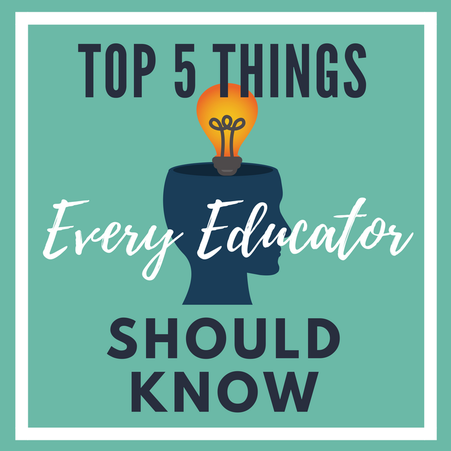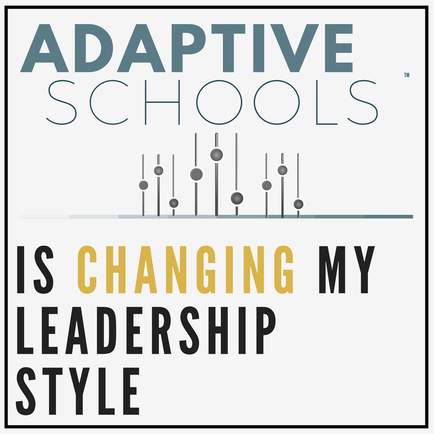 As I prepare for the upcoming school year, it’s a perfect time to reflect on my priorities as a leader. I’ve come to realize there are some priorities that ring true for all educators. In no particular order, this is my list of the top 5 things I hope every educator knows! 1 - Always set high expectations. Regardless of whether you are leading a building, teaching in a classroom, or even setting personal goals, I believe in the importance of setting high expectations. It is equally important to communicate those expectations very clearly. When expectations are clear, they will be supported, and they can be delivered! When expectations are high, status quo will be exceeded! 2 - Take time to invest in people. Taking time to learn about your employees, students, and neighbors is always a worthwhile endeavor. In business or administration, excellent people = excellent systems. Excellent teachers = excellent classrooms. I think everyone can learn something from everyone. Take the time to appreciate & learn about the people around you. Relationships matter most. 3 - Practice a solution-focused mindset. As a leader, my mission in life is to bring solutions to people instead of problems. Listen carefully to the people around you, and consider ways you might work toward solving an issue they are having. It’s what Southwest Plains has built our reputation on - Professional Learning...Innovative Solutions. My most successful colleagues and employees adhere to a personal code of working toward solutions rather than spending their time talking a problem or issue. Seek out new ways to make your systems more efficient, and look for ways to help, rather than detailing flaws in your current work. 4 - Learn something new every day. We live in the information age, and I cannot stress enough the importance of taking time every day to learn something new. Whether you watch a YouTube Video tutorial over your lunch break, read before bedtime, or take in the news each morning, it’s important for personal growth to learn something new every day. Much of my time is spent traveling across the state working in various school districts. This means I have lots of ‘windshield time,’ as I fondly call it. The easiest way for me to squeeze in some new learning is through listening to audiobooks. Many of the consultants at Southwest Plains listen to podcasts, join in educational twitter chats, and share books with one another. What are some creative ways you squeeze new learning into your everyday schedule? 5 - Flaunt your failures like a champ. This is something I try to model to my team each and every day. It’s OKAY to make mistakes - it’s how we learn and grow! Students AND teachers need to know that if you aren’t failing at something occasionally, you aren’t digging deep enough. The power in failing is taking in WHY something didn’t work out the way you intended and learning from that mistake. Failure IS an option, but it isn’t the FINAL outcome. My philosophy is to accept my failures, learn everything I can about that failure, and move toward the next goal. Admitting your mistakes doesn’t make YOU a failure - it makes you human. Growing and learning is a process, albeit not always an easy one, but it’s always worth it in the end. It’s your turn! What top 5 things do you believe every educator should know? Join in the comments to share your experience & knowledge!
0 Comments
 My path to to become a certified Adaptive Schools™ Seminar Trainer has NOT been easy, and it hasn’t always been fun, but it has been deeply fulfilling and is changing the way I teach, learn, and conduct meetings as CEO of my organization. I was intrigued with the content from the very beginning. As someone who’s “been in the business” of learning for close to 20 years, I have both been a learner and advocate for the work of Rick & Becky DuFour on Professional Learning Communities. In fact, my doctoral dissertation was based on this very topic. Adaptive Schools + PLCs/PCLs Within my first experience as a participant of an Adaptive Schools Seminar, I began to see a clear correlation between the work of Thinking Collaborative™ and my knowledge on professional learning communities. I view PLCs as the “Why” and Adaptive Schools as the “How”....to move groups toward shared learning and collaborative growth . Adaptive Schools is a capacity building system for teams….to increase their capacity to collaborate, to share varying ideas of groups, and to support one another - even in the face of conflict. One strategy I’ve really empowered my team to use is designating whether a meeting’s purpose is to Dialogue or Discuss. To Dialogue with one another is to gain a shared understanding of a topic. If the purpose is to Discuss an agenda item, then we work collaboratively to make a decision. Defining the outcome/purpose of an agenda item has truly transformed how meetings are conducted at Southwest Plains. Let’s discuss how powerful (and at times - difficult) working as teams can be! As I continue to grow & learn - I want to know: How might teams you work with (PLCs, administrative groups, local councils and chambers, etc.) benefit from a more collaborative agenda? What are your struggles and strategies for working in groups? Comment below & let’s ALL benefit from our shared experience!  Summer break is a time for relaxing, recharging your batteries, and preparing for a successful new school year. Whether you prefer to stay cool indoors, lounge by the pool, or hangout at the ball field, you might find yourself with a little time to read. These books are my recommendations for your summer reading list! My first recommendation is Lead Like a Pirate, by keynote & author Dave Burgess. On several occasions, Southwest Plains has had the opportunity to host conferences with the enthusiastic Dave Burgess as keynote. His passion for education, teaching, and leadership make him an engaging keynote. Dave is also an accomplished author. He is a fantastic example of continued engagement with his audience, as he is extremely active on Twitter where I’ve come to enjoy his frequent and informational posts. I read this book a few months ago, after seeing it make the rounds on Twitter, and can personally attest to it’s value. The book provides readers with practiced strategies that are easy to understand, implement, and will have a direct effect in your professional life,. I recommend this to anyone - I firmly believe that leadership is not a position or job title, it’s a mindset! Summer break is a perfect time to reflect on the year behind us in an effort to put our best foot forward for the coming school year. My favorite strategy showcased in this book and found on Dave’s blog is called Dropping ANCHORS. ANCHOR is an acronym for Appreciation, Notice the Impact, Collaborative Conversation, Honor Voice & Choice, Offer Support, and Reflect. My second recommendation has to be Collective Efficacy: How Educators’ Beliefs Impact Student Learning by Jenni Anne Marie Donohoo. Over the course of the last year or so, a large portion of my professional development workshops and consulting days have centered around the concept of Collective Efficacy. Leading educator & researcher John Hattie details in his book, Visible Learning, how collective efficacy of educators in a school has the largest effect size on student learning of any other variable. All educators should be working toward the shared goal of increasing collective efficacy within their schools. This book will give you structures & protocols to put in place in the coming year to build this vision. Consider starting a book club or PLC with your fellow educators and begin with this excellent resource! Lastly, I would be remiss if I didn’t mention my own book, #eWalkThrough: Digital System for Instructional Leadership. It’s timely for current eWalkThrough® users, as you can revisit the foundational tenets surrounding your system, reflect on goals and changes needed for the new school year, and recalibrate your thinking. For readers without a digital classroom observation system in place, it’s never been a better time to learn about our process and how it can change your district, buildings, classrooms, and culture. The format of the book makes a great reference, and you’ll be armed with information to share with colleagues about the power of classroom observation. Now I want to know...What is on YOUR reading list this summer? I’m always looking to learn, and would love a new book recommendations! Comment below with your suggestions & let’s get this conversation started! |
Kelly GillespieKelly's insights on classroom observation, education, leadership, teaching, and mentoring. Archives
July 2018
Categories
All
|
 RSS Feed
RSS Feed
